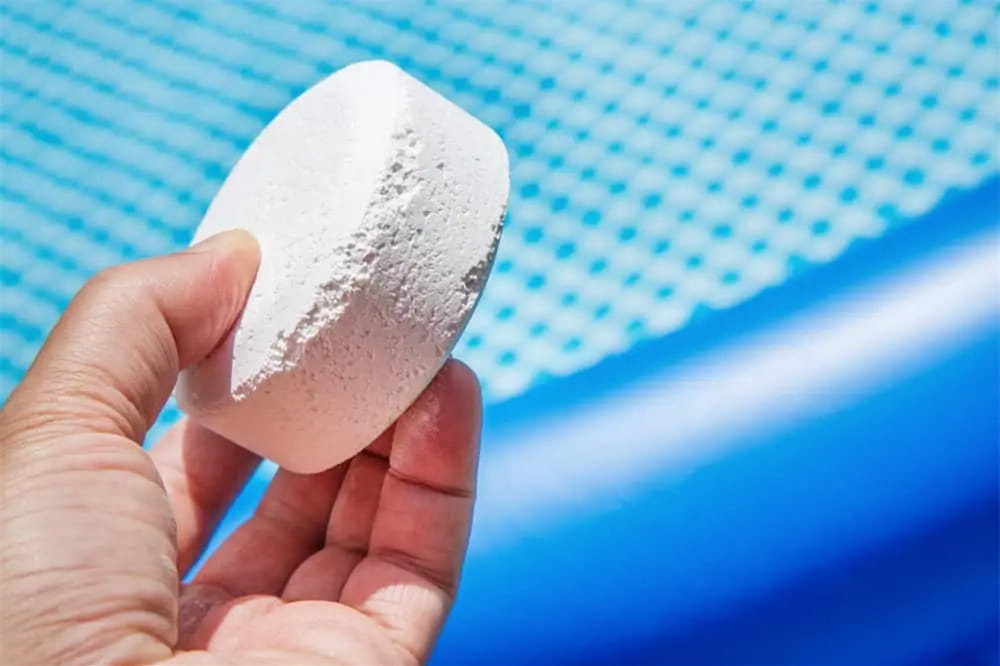As the blistering summer heat wave arrives, to some, the most appealing method of avoiding it is to plunge into a refreshing swimming pool and bask. Yet beneath that seemingly serene tranquility of that glassy water lies an unseen “battlefield”. The purity of the water must be protected at all costs because it has a direct impact on the health of everyone who swims. Among the various safety measures, pool chlorine tablets cannot be replaced. With the efficiency of an intangible watchman, they secretly work to keep the pool water clean and pristine.
I. Swimming pool water quality crisis
Did you ever experience the discomfort of having red, watery eyes and rashes on your body? These pesky ailments are so unbearable that they can even keep you away from the swimming pool. According to statistics reported by the health department, in badly disinfected swimming pools, there may be tens of thousands of disease-spreading microorganisms in each milliliter of water. The seemingly clean and attractive pool water can conceal potential health hazards. And that is where chlorine tablets come in as the ideal solution, quickly solving this problematic situation.
Swimmers’ natural substances like sweat, cosmeceutical residues, and dandruff create the perfect breeding ground for bacteria. Pathogens like Escherichia coli and Legionella find themselves in the perfect environment where they breed to terrifying degrees. Meanwhile, algae spores, carried by the wind, penetrate the water and thrive without restraint. The result? Cloudy and green water pools, become breeding grounds, potentially causing lots of illnesses, from respiratory conditions to skin diseases.
II. Disinfection Principle Revealed
Pool chlorine tablets defend the pool as the last “safety code” with their better disinfection process. Their core ingredient is trichloroisocyanuric acid, which releases hypochlorous acid as it comes into contact with water. The potent oxidant, functioning as a molecular scalpel, slices the bacterial cell wall and degrades the viral nucleic acid structures. It can kill hard bacteria such as Staphylococcus aureus and Candida albicans very effectively, with a high killing rate of up to 99.9%.
Slow-release is the favorable property of chlorine tablets, which keeps the residual chlorine level within the safe limit of 0.3 – 1.0mg/L. This balance provides efficient disinfection as well as protection from skin and eye irritation caused by over-chlorination. What is unique is that they are effective in killing hard-to-kill parasites like Cryptosporidium, which are resistant to conventional disinfectants. They create complete protection for sanitary pool water.
III. Misunderstandings and regulations in use
Though they function magnificently, there are several general myths regarding the application of chlorine tablets. The general belief is that the higher the amount of tablets taken, the more powerful the disinfectant effect, which is certainly incorrect. Chlorine does react with such compounds as urea in water when the pool has been over-chlorinated and forms toxic byproducts. These chemicals are not only pungent but also pose a potential long-term risk of cancer with extended exposure.
The second major omission is not adjusting the pH. The action of hypochlorous acid, the active component in chlorine tablets, is pH-dependent in pool water. As pH goes above 8, hypochlorous acid loses most of its activity, drastically compromising disinfection. To maximize the disinfecting power of the tablets, one needs to test and maintain pool water pH in the slightly alkaline range of 7.2 – 7.6.

IV. Advantages comparison
As regards pool disinfection, the use of chlorine tablets is superior to any other disinfecting process, with its distinct strengths. Tablets do away with a complex storage and delivery system, unlike liquid chlorine disinfection. This makes them safer since the risk of leakage, which has the potential of being fatal, is eliminated. Compared to chlorine dioxide disinfection, tablets are inexpensive and are capable of sustaining effective chlorine levels longer, hence giving sustained and guaranteed disinfection.
As science and technology advance, ultraviolet and ozone disinfection are introduced as novel disinfection methods. Ultraviolet disinfection involves the use of high-energy UV light to inactivate microorganism DNA, but it does not possess the continuous sterilization feature. Ozone disinfection is effective, but it has a very high equipment cost. In addition, volatility in ozone prevents a uniform disinfecting effect in water. Therefore, chlorine tablets are still the most common disinfecting tool for pool sanitizing.
Conclusion
Behind each refreshing plunge lies the quiet dedication of chlorine tablets. Riding on the technology of scientific brilliance, they are the unyielding guardian of our health, turning each pool into a haven.
As one of the top professional chlorine tablets manufacturers and exporters, we implement rigorous quality control at each stage of production. With us, you’re working with a reliable partner for water quality maintenance!

